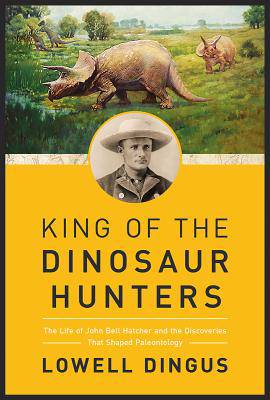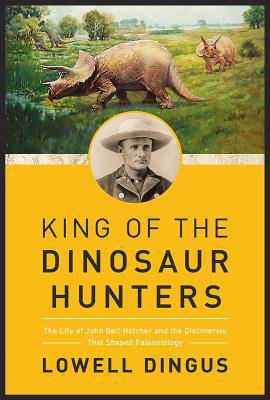
- Afhalen na 1 uur in een winkel met voorraad
- Gratis thuislevering in België vanaf € 30
- Ruim aanbod met 7 miljoen producten
- Afhalen na 1 uur in een winkel met voorraad
- Gratis thuislevering in België vanaf € 30
- Ruim aanbod met 7 miljoen producten
Zoeken
King of the Dinosaur Hunters
The Life of John Bell Hatcher and the Discoveries That Shaped Paleontology
Lowell Dingus
Paperback | Engels
€ 20,95
+ 41 punten
Uitvoering
Omschrijving
The story of the extraordinary adventures behind the man who has discovered some of the amazing wonders of natural history. Every year millions of museum visitors marvel at the skeletons of dinosaurs and other prehistoric creatures discovered by John Bell Hatcher. The life of the "King of Collectors" is every bit as fascinating as the mighty bones and fossils he unearthed. Hatcher helped discover and mount much of the Carnegie Museum's world famous, 150 million-year-old skeleton of Diplodocus, a slender-necked, long-tailed, plant-eater whose skeleton has captivated our collective imaginations for more than a century. But that wasn't all Hatcher discovered. During a now legendary collecting campaign in Wyoming between 1889 and 1892, Hatcher discovered a 66 million-year-old horned dinosaur, Torosaurus, as well as the first scientifically significant set of skeletons from its evolutionary cousin, Triceratops. Refusing to restrict his talents to enormous dinosaurs, he also discovered the first significant sample of mammal teeth from our relatives that lived 66 million years ago. The teeth might have been minute, but this extraordinary discovery filled a key gap in humanity's own evolutionary history. Hatcher's discoveries form the bases of some of the most beloved and well-known collections and institutions in the world--Yale, The Peabody Museum, Princeton University, the Carnegie Museum, and more. Nearly one hundred and twenty-five years after Hatcher's monumental "hunts" ended, acclaimed paleontologist Lowell Dingus invites us to revisit Hatcher's captivating expeditions and marvel at this real-life Indiana Jones and the vital role he played in our understanding of paleontology.
Specificaties
Betrokkenen
- Auteur(s):
- Uitgeverij:
Inhoud
- Aantal bladzijden:
- 544
- Taal:
- Engels
Eigenschappen
- Productcode (EAN):
- 9781643133492
- Verschijningsdatum:
- 13/10/2020
- Uitvoering:
- Paperback
- Formaat:
- Trade paperback (VS)
- Afmetingen:
- 140 mm x 210 mm

Alleen bij Standaard Boekhandel
+ 41 punten op je klantenkaart van Standaard Boekhandel
Beoordelingen
We publiceren alleen reviews die voldoen aan de voorwaarden voor reviews. Bekijk onze voorwaarden voor reviews.











